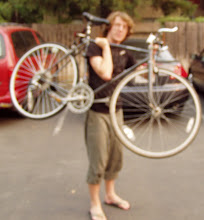I took Bri's board surfing with Caius and a friend while visiting home for Thanksgiving. There wasn't a very good break at the beach we went to, but the waves were medium-sized and surprisingly strong. I snapped Bri's longboard in half. I didn't do anything special, just got knocked off the board and dragged under by the leash. Another wave followed and snapped the board while I was underwater. That was it.
I really loved that board, which brings me to my theory on the nature of grief and loss. I believe that the emotional fallout of loss, which is to say grieving, is the process of disentangling the lost thing from your vision of the future. I didn't realize it until now, but I really wanted to hang ten off that board.
Bri wasn't overly bummed about losing her board. She had always magnanimously taken my board when the two of us surfed. Our surf guru, my mom's exboyfriend Bob, however, adored it. The board was a full length longboard, broad winged and thin with an extra-light shell. This made it particularly fragile and a rather elegant ride. The board was quite sensitive for its length and could turn as fast as my much shorter board. The broad nose always beckoned me to try and get my toes on it, but it also caught the breeze like a sail, which was especially inconvenient because of the ease with which the board turned.
After the board broke, I gathered up the two pieces and took them home. Caius asked if we could repair it, but breaking in half is universally understood as a surf board's death sentence. Once the wood stringer's integrity is ruined, there's no way to make the board whole again. Bob wanted to make sure we'd kept the pieces, though, because he had a friend who could make a replica based on them. Bob estimated it would cost four hundred to make (the price moderately-used longboards go for in retail surfshops). Knowing Bob and his trouble with alcoholism and, even when sober, with finances, Mom predicted that he'd never get the money together for the board.
That not-quite-loss makes the whole experience more agonizing. The possibility of riding a board like that again makes it that much harder to let go. But let go we must. No good will come from wistfully looking forward to a day that will not come. Unfortunately, Bob left that cursed glimmer of hope and I'll likely have trouble shaking the image of one day riding a board like that. Instead of dealing that loss decisively, that hope will linger and gnaw on dark cold nights. Sometimes I wish that board's reincarnation was impossible.
We also must remind ourselves that, excepting the people we had at birth, loss necessarily must follow gain, and for all that we've had, our lives have been richer for it and we are still the better for it. I'm a much better surfer than I was before I started riding Bri's board.
We should also remind ourselves of all that we still have. Though I transferred technical ownership of my board to Bri, I'll still be able to ride it whenever I get a chance. I've always really liked my board. It doesn't paddle quite as fast or have a broad, inviting nose, but it's a more durable and versatile board. I think every surfboard has something to teach the rider, so my surfing may ultimately benefit when I eventually buy a new board to replace the one I ceded to Bri. Of course, I'll have to return to living on the coast for that to happen.
Subscribe to:
Post Comments (Atom)

No comments:
Post a Comment